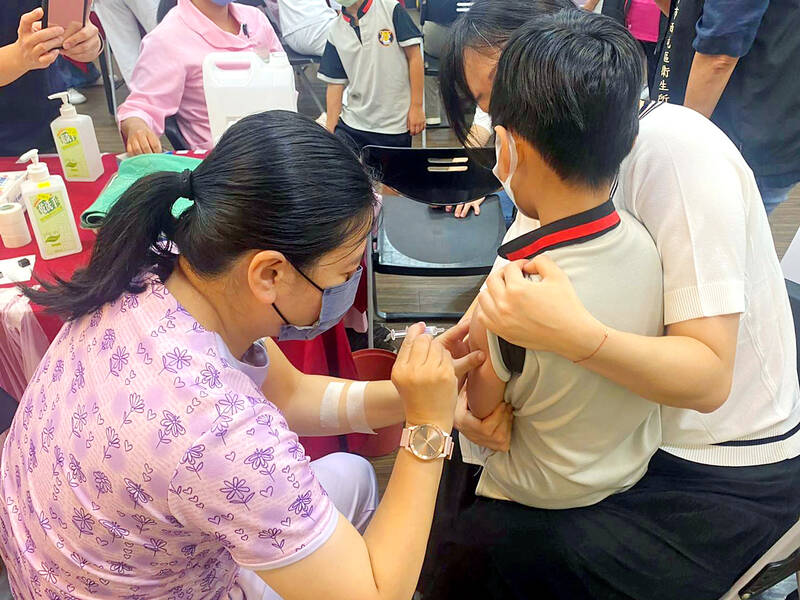Clinical trials in other nations could be used to prove vaccine efficacy and safety according to international standards, the Food and Drug Administration (FDA) said yesterday, in response to accusations that a Medigen application to import a South Korean influenza vaccine was approved without full clinical trials in Taiwan.
The government flu shot program that began on Oct. 2 for the first time included a fourth quadrivalent flu vaccine from South Korean drugmaker GC Biopharma imported by Medigen.
Chinese Nationalist Party (KMT) Legislator Wang Hung-wei (王鴻薇) on Monday said that she had requested that the Ministry of Health and Welfare provide records of Medigen’s application, including clinical trial results, but was rejected on the grounds that they are “trade secrets.”

Photo: Su Chin-feng, Taipei Times
“The only trials conducted in Taiwan were on people aged 20 to 50, with other trials all conducted in South Korea,” she wrote on Facebook, asking how the public can trust vaccine safety if the trial data remain opaque.
At a news conference in Taipei yesterday, FDA Deputy Director Cheng Hwei-fang (陳惠芳) detailed the vaccine approval process used to approve all six available brands.
There is no requirement that clinical trials are conducted in Taiwan, only within Asia, Cheng said.
Taiwan is also more stringent than South Korea, which allows children six months and older to receive the GC Biopharma flu vaccine, compared with three years and older in Taiwan, she said.
When studied through an internationally recognized method of assessing “ethnic factors in the acceptability of foreign clinical data,” the South Korean data were determined to be insensitive to ethnic factors and could therefore be considered in the review process, she added.
Medigen also submitted information obtained from GC Biopharma’s clinical trials conducted in three age groups — three to 18, 19 and older, and 65 and older — Cheng said.
The other approved flu vaccines were similarly determined to be insensitive to ethnic factors and did not require local clinical trials, she said.
As for the refusal to publicize Medigen’s application, Cheng said the FDA has an obligation to maintain the confidentiality of trade secrets under Article 40-1 of the Pharmaceutical Affairs Act (藥事法), and that the data constitute “trade secrets” as defined in the Trade Secrets Act (營業秘密法).

‘DENIAL DEFENSE’: The US would increase its military presence with uncrewed ships, and submarines, while boosting defense in the Indo-Pacific, a Pete Hegseth memo said The US is reorienting its military strategy to focus primarily on deterring a potential Chinese invasion of Taiwan, a memo signed by US Secretary of Defense Pete Hegseth showed. The memo also called on Taiwan to increase its defense spending. The document, known as the “Interim National Defense Strategic Guidance,” was distributed this month and detailed the national defense plans of US President Donald Trump’s administration, an article in the Washington Post said on Saturday. It outlines how the US can prepare for a potential war with China and defend itself from threats in the “near abroad,” including Greenland and the Panama

A wild live dugong was found in Taiwan for the first time in 88 years, after it was accidentally caught by a fisher’s net on Tuesday in Yilan County’s Fenniaolin (粉鳥林). This is the first sighting of the species in Taiwan since 1937, having already been considered “extinct” in the country and considered as “vulnerable” by the International Union for Conservation of Nature. A fisher surnamed Chen (陳) went to Fenniaolin to collect the fish in his netting, but instead caught a 3m long, 500kg dugong. The fisher released the animal back into the wild, not realizing it was an endangered species at

The Chinese Nationalist Party (KMT) is maintaining close ties with Beijing, the Democratic Progressive Party (DPP) said yesterday, hours after a new round of Chinese military drills in the Taiwan Strait began. Political parties in a democracy have a responsibility to be loyal to the nation and defend its sovereignty, DPP spokesman Justin Wu (吳崢) told a news conference in Taipei. His comments came hours after Beijing announced via Chinese state media that the Chinese People’s Liberation Army’s Eastern Theater Command was holding large-scale drills simulating a multi-pronged attack on Taiwan. Contrary to the KMT’s claims that it is staunchly anti-communist, KMT Deputy

The High Prosecutors’ Office yesterday withdrew an appeal against the acquittal of a former bank manager 22 years after his death, marking Taiwan’s first instance of prosecutors rendering posthumous justice to a wrongfully convicted defendant. Chu Ching-en (諸慶恩) — formerly a manager at the Taipei branch of BNP Paribas — was in 1999 accused by Weng Mao-chung (翁茂鍾), then-president of Chia Her Industrial Co, of forging a request for a fixed deposit of US$10 million by I-Hwa Industrial Co, a subsidiary of Chia Her, which was used as collateral. Chu was ruled not guilty in the first trial, but was found guilty